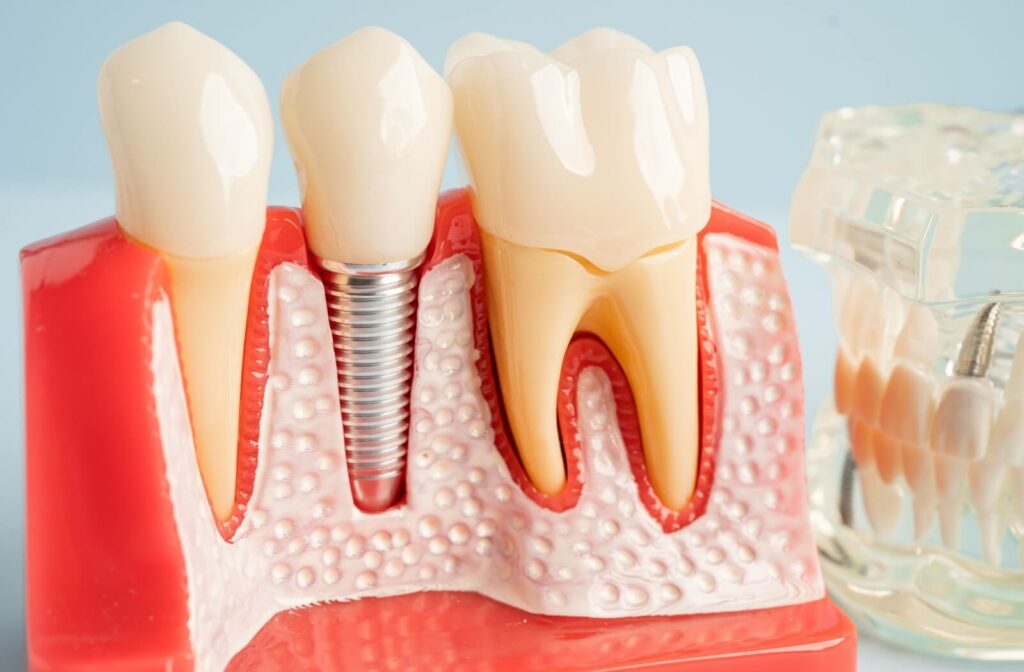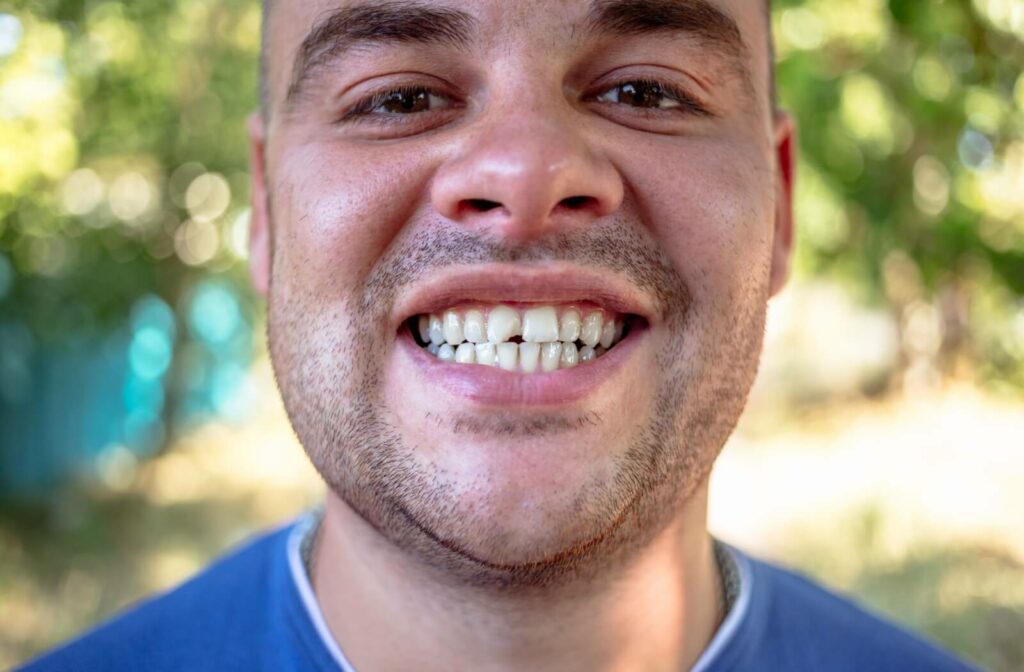A chipped tooth can happen to anyone. An awkward slip, a hard bite, or even an accidental knock can lead to that frustrating moment when you run your tongue along your teeth and feel something missing.
Chipped teeth are common, but they’re also usually fixable.
Your dentist can fix a minor or severe chipped tooth with the following treatment options:
- Dental bonding
- Veneers
- Crowns
- Implants
What Is a Chipped Tooth?
A chipped tooth is a dental injury that involves loss of or damage to a portion of the tooth. It’s often the result of accidental trauma or biting/chewing on hard objects. The severity of the chip can range from being a cosmetic concern to involving more severe damage that impacts the inner layers of the tooth:
- Minor chips: These are superficial and may only affect the outer enamel. Although they’re mostly cosmetic, they can still cause sensitivity or discomfort.
- Moderate chips: These chips extend deeper into the tooth structure and may expose the dentin (the layer beneath the enamel), causing increased sensitivity and potential for infection.
- Severe chips or cracks: These often involve significant damage, possibly impacting the tooth’s pulp (the inner nerve and blood vessels). Severe chips may require more extensive restorative treatments to save the tooth.
A tooth chip can feel jagged on the tongue and may present with other symptoms, such as:
- Gum irritation around the chipped tooth
- Tongue irritation from rubbing on the chipped edge
- Tooth pain from biting pressure from severe chip
Regardless of severity, it’s important to consult your dentist, who can assess the damage to your tooth and recommend a path forward.
Common Treatment Options to Fix a Chipped Tooth
If you’ve chipped a tooth, there are both immediate and permanent fixes available. The severity of your case will determine the most appropriate treatment.
Dental Bonding
For a smaller chip, dental bonding is often the go-to solution. Bonding uses the same material as a filling but is applied differently.
Dental bonding involves applying a tooth-coloured resin to the chipped area and shaping it to blend with your natural tooth. This process is quick, typically takes just one visit, and can last several years with proper care.
Veneers
Veneers are great for front teeth. Veneers are thin, custom-made shells designed to cover the surface of your tooth. They’re made of porcelain or resin composite materials, providing a durable and natural-looking finish.
Veneers are ideal for chips with cosmetic implications, as they can look quite natural. While veneers may take a few visits to complete, they’re a long-term investment in both aesthetics and protection.
Crowns
Crowns can treat severe chips or large portions of the tooth missing.
A crown is a cap-like covering that encases the entire tooth, restoring its shape, strength, and appearance.
A crown procedure happens over two appointments. In the first appointment, your dentist prepares the tooth and takes impressions. In the second appointment, they fit the permanent crown. You can get a temporary crown before the permanent ones are ready.
Dental Implants
Dental implants are an effective option for teeth that are too damaged to save. If a chip extends to the root and the tooth can’t be restored, your dentist may recommend extracting the tooth and replacing it with a dental implant.
Dental implants provide a durable, natural-looking replacement option that functions like a real tooth. The process can span several months, as it involves placing the implant, allowing it to integrate with your jawbone, and then attaching the final crown or tooth replacement. However, implants offers a long-term solution to a severe dental injury.

Tips for Preventing Tooth Chips
While you can repair a chipped tooth, there are ways to prevent chips and keep your teeth safe and healthy:
- Avoid hard foods: Be cautious when eating hard candies, ice, or popcorn kernels.
- Use a mouthguard: Protect your teeth with a custom mouthguard during sports or grinding (bruxism).
- Maintain good oral hygiene: Brush twice daily, floss daily, and don’t skip dental exams and cleanings to keep your teeth strong and healthy.
- Don’t use teeth as tools: Don’t open bottles or packages with your teeth; they’re not designed for the job!
By adopting these habits, you can minimize the risk of future chips and maintain a pristine smile.
Restorative Dental care
Chipped teeth are a common dental issue, but they don’t have to ruin your smile—or your confidence. With plenty of treatment options available, there should be a fix available for your situation. The key is to act quickly and consult your dentist for professional care.
If you have dental concerns such as a missing or damaged tooth, book an appointment with Upper Gage Dental Centre. We can provide personalized advice on treatment to restore your tooth to its full function.



